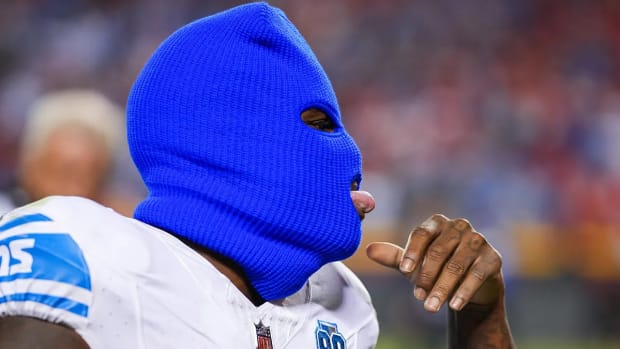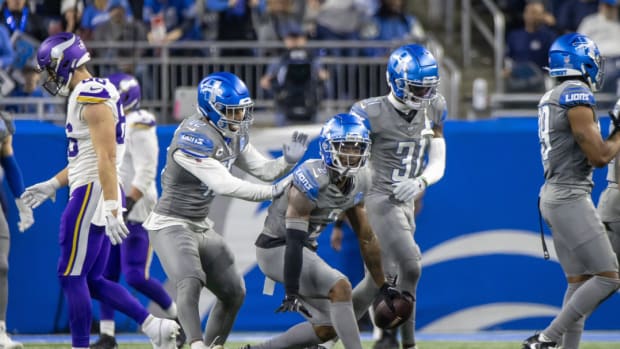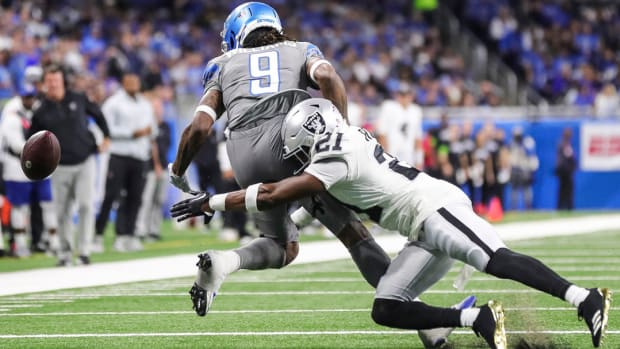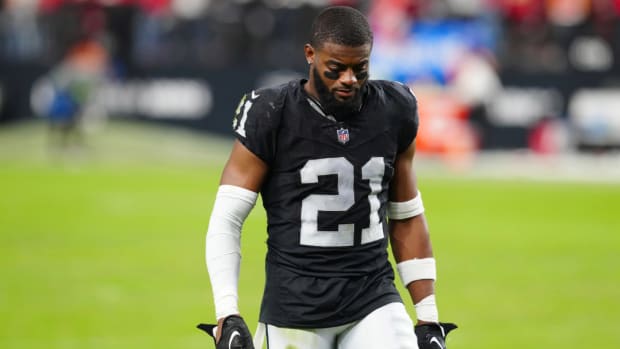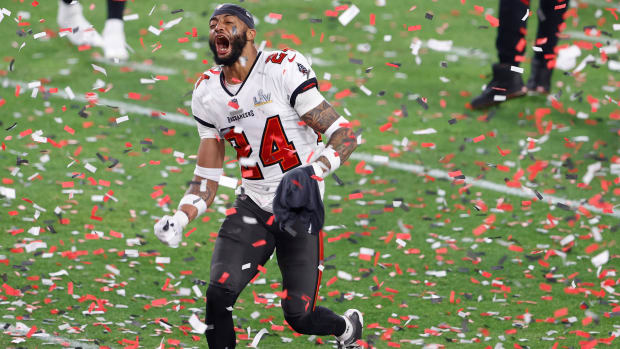Pros and Cons of Lions Tanking
According to the Iowa Law Review, "tanking" is a term used to describe when sports teams lose games on purpose to secure some sort of future competitive advantage.
However, as we know, you can’t lose games on purpose in the NFL.
So, for the purpose of this discussion, let’s define tanking as not trying one’s best to win in various ways.
This includes -- but is not limited to -- resting players going through an injury even if they’re cleared to return, playing more of a team’s young core rather than constantly rotating starters and concentrating more on offseason draft prep and free agency plans than winning games.
And all of that should result in losing.
At least that’s what the front office is aiming for -- looking at you, Dolphins, which somehow just beat the Eagles.
The Lions are eliminated from playoff contention, and if the NFL Draft were today, they would pick sixth.
But what would the benefits be of losing -- not on purpose but via resting quarterback Matthew Stafford and any other player nursing an injury -- the final four games of the regular season and taking the “tanking” to the next level in the 2020 offseason?
Let’s assess.
The pros of tanking
1.) A chance at Ohio State defensive end Chase Young in the NFL Draft
While this draft is historically deep on receivers along with a crop of quarterbacks worthy of a first-round pick, the defensive side of the ball doesn’t have a laundry list of sure-fire prospects.
At No. 6 overall, Detroit -- whose defense ranks 29th in the league -- should draft a high-impact player to remedy its struggling defensive unit.
The Lions also are only one game back of the No. 3 pick -- Falcons, Dolphins and Redskins have the edge -- two games back of the No. 2 pick (Giants) and three from the No. 1 overall selection (Bengals).
And seeing that the only without-a-doubt, game-changing defensive prospect worthy of a top-five selection is Ohio State EDGE rusher Chase Young, Lions fans need to hope that all of the teams above them as well as their own franchise continue to lose.
But hoping for that is a stretch, given that those franchises are hoping for the same thing: losses.
Should Detroit hang around the No. 4-to-No. 6 pick range, it will still find a difference maker.
Maybe not to the magnitude of Young, but a defender that still can be a key piece to a Lions rebuild.
One interesting prospect that should be available in that pick range is OSU cornerback Jeffrey Okudah.
Okudah shut down Michigan wide receiver Nico Collins, among many others, in Big Ten play this season.
He would immediately start opposite Darius Slay with Justin Coleman in the slot, creating a fearsome Lions pass defense. All three defensive backs would be on multi-year contracts, too.
Others that should be available in that pick range include Iowa EDGE rusher A.J. Epenesa, Clemson linebacker/safety Isaiah Simmons, LSU safety Grant Delpit and Auburn defensive tackle Derrick Brown.
2.) Fire sale!
Ah, yes. Every front office’s favorite part of a rebuild -- saving money and gaining assets.
Detroit doesn’t have a ton of money invested across its roster, similar to the situation that the struggling Falcons are in.
However, there are cap hits it could ship off and save for a rainy day in free agency in 2021 and beyond, while acquiring draft picks in 2020, 2021 and 2022.
According to OverTheCap.com, Detroit has a little over $18 million in cap space, but it has an opportunity to go beyond that number via trades and roster cuts.
Veteran offensive tackle Rick Wagner’s cap hit of $11.5 million might be untradeable, considering his Pro Football Focus grade of 58.2 which ranks him 55th among NFL tackles.
But if Detroit could find a suitor desperate enough for a veteran tackle, it’d be a wise move to ship him out of Motown if the switch is flipped to full-on tank mode.
Or the Lions could cut him.
Doing so before June 1 saves Detroit $6.1M in cap space, while holding $5.8M in dead money.
But the wise move would be to wait after June 1, which would save Detroit $9 million in cap space and leave $2.9M in dead money.
In 2020, the books get bigger for the Lions, going from five contracts at over $7 million to nine.
Defensive tackle Damon Harrison ($11.75M), offensive tackle Taylor Decker ($10.35M), linebacker Devon Kennard ($7.175M), tight end Jesse James ($5.27M) and defensive end Romeo Okwara ($4.1M) would all be options to trade and subsequently increase cap space while acquiring assets for the future.
Harrison, Decker and Kennard each could result in high-round picks via trades.
And of course, Detroit could deal quarterback Matthew Stafford and his $31.5 million contract.
But a trade before June 1 only saves $11.5M in cap space while leaving $20M in dead cap.
And should the franchise wait until after June 1, it saves $15M while leaving $16M in dead cap in 2020 and $10M in 2021.
A trade of Stafford would also free up space for free agents from the 2021 class, including Slay, safety Jamal Adams, cornerback Jalen Ramsey, offensive tackle Trent Williams, quarterback Patrick Mahomes, running back Christian McCaffrey, linebacker Von Miller, linebacker Melvin Ingram and cornerback Patrick Peterson, among others.
Obviously, all of these guys won’t be free agents -- some will re-sign with their current squads.
But nonetheless, it’s as attractive of a free agent class in a long time.
The cons of tanking
1.) Fan interest will plummet
Tanking wasn’t a commonly used term in NFL circles when the Lions managed to finish 0-16 in 2008.
And since, it's done Detroit no good.
The franchise, most notably, has remained winless in the playoffs.
What you might remember about the dark ages of Detroit football are the blackouts.
Detroit games weren’t broadcast, the stadium was empty and virtually nobody cared about the Lions in the city.
Obviously, blackouts are no longer a factor with the magic of NFL TV deals, but the lack of fan interest that can result from tanking is still a real concern.
Why, you may ask?
Well, because it took Detroit over a decade to make its fanbase passionate again. How long would it take to make it happen this time around?
Detroit’s 2019 season was promising before Stafford’s injury and the defense’s nosedive.
A September matchup with the Chiefs saw a sold-out Ford Field with Lions fans that were loud and proud all game long.
Fan interest is fun.
It’s also beneficial to the Ford family’s wallets and the franchise’s funds.
Nobody wins with low fan interest.
And if Atlanta’s brand new, state-of-the-art Mercedes-Benz Stadium can be empty despite all of its amenities -- which has been the case the majority of this season, then so can Ford Field.
2.) Detroit’s roster could be competitive next season
OK, it’s the Lions.
Bob Quinn and Matt Patricia haven’t lived up to a single expectation, and the franchise is going to finish with six or less wins for a second straight season.
However, hear me out here: the roster has an opportunity to be good next season, contingent on health and money being spent wisely in free agency.
Spending money on free agents and not shedding the cap hits you have on the roster to further improve your chances of winning in 2020 are the opposite of tanking.
The Lions, though, will see contracts expire for veteran wide receiver Danny Amendola ($4.5M), defensive lineman Mike Daniels ($8.1M), safety Tavon Wilson ($3.5M) and cornerback Rashaan Melvin ($2.1M).
It’s hard to imagine any of those players returning with similar price tags or returning at all -- aside from a fan-favorite in Amendola.
That’s quite a bit of cap space to attribute towards 2020 free agents.
Additionally, if Stafford continues making the strides he made in 2019 -- NFL.com ranked him No. 6 overall based on his play in eight games -- Detroit has a shot in any game in 2020.
Elite wide receivers Kenny Golladay and Marvin Jones are set to return. A much-improved Graham Glasgow is sure to be re-signed, and the rest of the offensive line should be back, too.
The only signing or draft choice Detroit needs to make from an offensive perspective is at running back to complement the oft-injured Kerryon Johnson.
A guard to fill in for Kenny Wiggins would also be nice but should be considered a luxury type of upgrade.
Defensively, Detroit should try to make some splashes in free agency.
Signing a cornerback like Byron Jones or Logan Ryan or an EDGE rusher like Shaquil Barrett or Yannick Ngakoue.
And due to a linebacker shortage in the 2020 draft, signing Cory Littleton or Blake Martinez should be high on the Lions' priority list this offseason.
Detroit could also -- and likely will -- upgrade its defense via the draft, which we already mentioned.
Ultimately, the type of moves the team makes on the defensive side of the ball will dictate how equipped it is to consistently win games next season.
All that being said, there’s an argument to be made for both tanking and trying to compete in 2020.
What the franchise decides to do next will be pivotal. It will either lead to the narrative of the franchise changing or it remaining the same for years to come.













